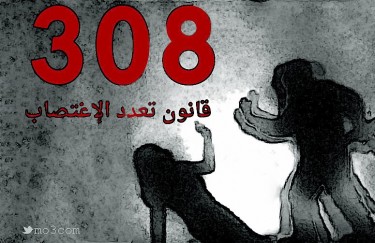In March of this year, 16-year-old Moroccan Amina Filali committed suicide after she was forced to marry her rapist, and Moroccans expressed their outrage at the incident. Now Jordanians are speaking up about a 15-year-old rape victim who has been married off to the man convicted of raping her, whose death sentence has been dropped as a consequence.
The sentence was dropped thanks to Article 308 of the Jordanian Penal Code that allows convicted rapists to walk free if they marry their victims. A campaign has now been launched to get the law abolished.
Blogger Naseem Tarawnah summarised the case that has angered people:
A 19 year old Jordanian kidnaps a 14 year old girl (with the assistance of his family) – takes her to a location where a tent was set up for him to rape her repeatedly for three straight days before the police roll in. The court sentences him to death by hanging but he manages to produce a very recent marriage certificate signed by a judge. The court then stays the execution but claims that it will be reinstated should the boy divorce her without a “justifiable cause”. A professor of sociology from the University of Jordan was widely quoted by the original article produced by Arab Al Yawm – that “women are different in nature from men” and that the girl should now make her best of the situation and play the role of a good wife, mostly by putting this whole silly rape thing behind her.
Twitter users in Jordan have condemned Article 308 and expressed their outrage at the way criminals are permitted to escape punishment while their victims are effectively punished. Activists and concerned Jordanians have been tweeting about Article 308 under the hashtag #جريمة308 (#Crime308) [ar] in order to raise awareness, and to garner support for a petition that aims to collect 20,000 signatures [ar] against Article 308:
The petition also calls for stricter punishments for sexual assault and for the annulment of the category itself. In Jordan, sexual assault is any forced sexual act save for forced penile-vaginal penetration, which is the only act legally regarded as rape. Consequently, the rape of a male is not legally seen as rape, and neither is the forced penile-anal penetration of a female.
Tweets under the #Crime308 hashtag have mostly focused on the personal and social cost of Article 308 and highlighted its failings.
Zain tweeted:
Abd Ashhab wrote:
Hadeel Abdel Aziz, Executive Director of Jordan's Justice Center for Legal Aid affirmed:
Raffoul H. Abubaida wrote:
Hadeel Maaitah tweeted:
@girl_brainy: Imagine tweeting once a day using #جريمة308 saves one victim! Cumulative effort will save victims & save girls from becoming ones
The campaign against Article 308 was launched just weeks ago, but in this short period the campaign has had two volunteer meetings, gathered over 2000 signatures on its petition, and received considerable media coverage. Active beyond Twitter, the campaign is also present on Facebook.
Its use of social media has enabled it to get the support of prominent figures like the head of the Jordan National Commission for Women, an ex-minister, and an MP. However, Jordanian public outrage at this injustice is yet to bear fruit in the form of the abolishment of Article 308. There are high hopes this will be achieved before Jordan gets its own Amina Filali.








9 comments
This article reminds me of a documentary “Honour Me” is the shocking true story of Sameem’s struggle to break free from her past and fight back against her upbringing. Sameem was forced to marry a complete stranger, and raped on her wedding night.
To watch this documentary please visit – http://www.cultureunplugged.com/play/3518